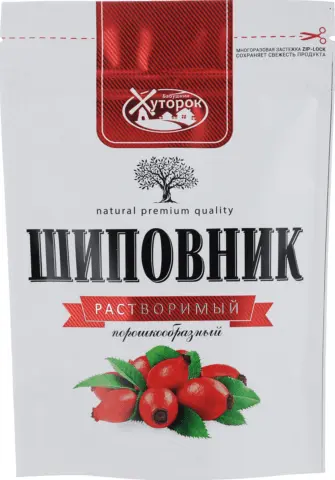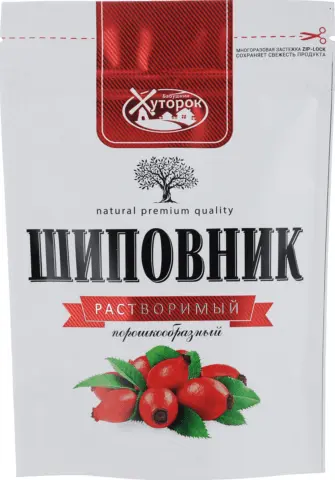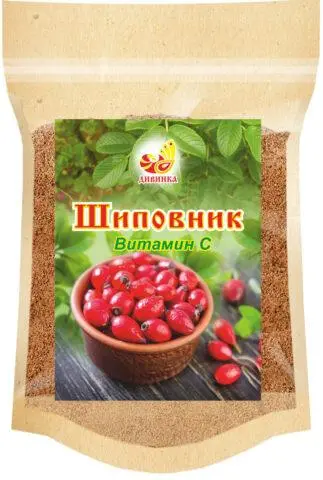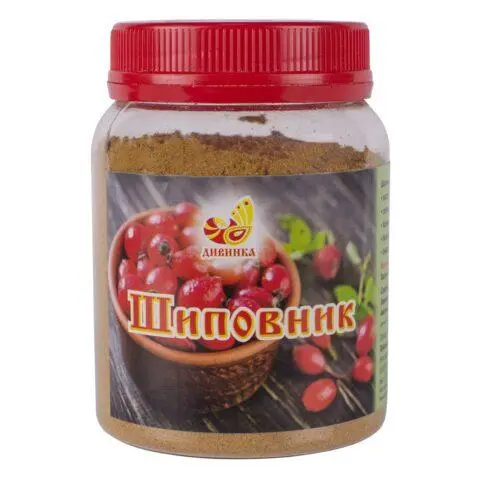Contents
The benefits and harms of soluble rose hips are determined by its chemical composition. The product is obtained on the basis of berries, which are kept in hot water for a long time. This allows you to save a significant part of the nutrients, including up to 80% of vitamin C. It is used in the form of tea for the prevention and treatment of a number of diseases.
What is Soluble Rosehip Extract
Rosehip extract is a natural powdered herbal remedy that is soluble in water. Appearance is a dry powder with small particles. It dissolves well in water. It has a specific smell and taste of fresh rose hips.
The product is quite high-calorie – 160 kcal per 100 g. But the powder is used in small quantities. For example, 1–2 tsp is enough to make tea. Nutritional value per 100 g:
- proteins – 1,7 g;
- fats – 0,6 g;
- carbohydrates – 40
Rosehip extract is produced in the following forms:
- fine powder;
- granular composition;
- syrup;
- butter.
All these drugs are taken orally, with the exception of oil – it is indicated for external use.
How is rosehip extract obtained?
Dry rosehip extract is made from the berries of the plant. The technological process consists of several stages:
- Selection and removal of substandard berries. Washing the rosehip.
- Grinding on a special apparatus.
- Mixing with water and insisting on a water bath.
- Extraction and pressing.
- Drying, obtaining a homogeneous, fine powder.
All the described stages take place in the AI-300 infunder apparatus. Extraction is carried out by keeping the raw material in hot water. Then the vessel is cooled to a temperature of 20 degrees, the mixture is filtered and the cake is removed.
The described process allows you to save almost all useful substances, including vitamin C. At the same time, part of the plant cells do not have time to heat up to the desired temperature and do not give up their substances to the extract. Therefore, they partially go into ballast.

Soluble powder is obtained industrially from rose hips
Composition of rosehip extract
The extract contains the same components as in the fruits of the plant. The benefits and harms of instant rosehip powder are determined by its composition:
- vitamins – C, K, B1, B2, PP, E, P;
- carotenoids (carotene, lycopene, violaxanthin and others);
- flavonoids (quercetin, tiliroside, rutin and others);
- organic acids (citric, linoleic, malic, oleic);
- lipids;
- carbohydrates (simple sugars, polysaccharides);
- tannins;
- pectin;
- steroids;
- anthocyanins;
- phytoncides;
- essential oils and others.
Benefits of Soluble Rosehip Extract
The benefits of soluble rose hips for the body have been proven by official medicine. The extract contains vital vitamins and other active substances. They strengthen the immune system, have a tonic effect, inhibit inflammation, act as a choleretic agent. The components of the extract also promote wound healing, strengthen blood vessels and normalize blood pressure.
Rosehip powder has found a fairly wide application. The extract is used for the prevention and treatment of diseases and disorders:
- infections, including chronic ones;
- liver disease (hepatitis, cholangitis, cholecystitis, alcohol poisoning);
- hemophilia;
- internal bleeding (uterine, pulmonary);
- hyperthyroidism;
- to eliminate signs of an overdose of anticoagulants;
- beriberi for vitamin C and P;
- iron deficiency (low hemoglobin);
- ulcerative colitis nonspecific (enemas);
- cracks, abrasions, bedsores, trophic ulcers, dermatoses (external use).
The health benefits of soluble rosehip are quite obvious, but it does not bring harm. It can be used even in diabetes. The components of the extract help lower blood sugar levels, stimulate the pancreas.

Rosehip powder is indicated for liver pathologies
How to make tea from powder
Making tea from rosehip powder is quite simple. A single dose is 1-2 tsp. in a glass of hot (not boiling) water. Stir the powder until completely dissolved and let it brew for several minutes. To taste, you can add:
- sugar;
- honey;
- jam;
- lemon juice;
- ginger.
The maximum benefit of rosehip extract powder can only be obtained with regular use. The dosage depends on the form of the drug and the goals of treatment. The tool is used in this way:
- For internal use, take a granular powder in an amount of 1,5 g and dissolve in warm water (50 ml). Take for treatment 2-3 times a day, regardless of the meal. For prevention, you can drink the solution once a day.
- For the treatment of dermatosis, a soluble powder is taken orally twice a day, one teaspoonful. Can be used as a tea or simply washed down with warm water.
- Rosehip oil is recommended for external use: it is applied to a napkin and applied to the affected area. With its help, bedsores, nipple cracks during lactation, trophic ulcers are treated.
- The oil is used to eliminate fetid rhinitis (ozena). To do this, they are moistened with cotton swabs and injected into the sinuses.
- Another option for using the oil is to treat ulcerative colitis. It is administered through an enema (volume 50 ml). Put 3-5 times a day (total up to 30 enemas).
- Soluble rosehip powder extract has benefits for hair as well. To do this, the oil composition is rubbed into the hair and scalp and kept for 20–25 minutes, after which it is simply washed off with warm water. It is not necessary to use a cap or film. This product nourishes and strengthens the hair, thanks to which the natural shine returns to them. Suitable for all hair types (except oily).

Soluble rosehip powder is used as a tea
Before prolonged use, it is recommended to consult a doctor.
Противопоказания
The soluble rosehip extract has both beneficial properties and individual contraindications. All of them are relative in nature – there are no strict prohibitions.

If a person is diagnosed with an allergy to citrus fruits, rosehip extract is contraindicated for him
In some cases, it is not recommended to use the powder without the consent of the doctor:
- Children can take the remedy only from the age of three – this is the only strict contraindication.
- The use of powder by pregnant women is allowed only when prescribed treatment by a specialist. During lactation, the use of the product is not only not prohibited, but rather desirable. The components of the berries stimulate the formation of breast milk.
- Allergic reactions (itching, redness, and others) associated with individual intolerance to individual components. Allergy sufferers may want to try a small dose of the extract first, such as one glass of tea. After that, you need to pay attention to the reaction of the body.
- Gastritis with high acidity, the presence of ulcers in the stomach or in the duodenum. The organic acids contained in the rosehip extract can aggravate the course of the disease.
- Hereditary or acquired predisposition to increased blood clotting.
- Hypotension (low blood pressure). Soluble rosehip powder leads to pressure reduction. Therefore, it should be used by people with hypertension.
- Urolithiasis disease. The vitamin C contained in the soluble rosehip powder extract leads to the formation of stones, which can aggravate the course of the disease.
- Caution should be taken by elderly people suffering from constipation.
- Excessive use of the powder can lead to damage to tooth enamel due to the large proportion of organic acids. To avoid this, it is recommended to take a drink through a straw.
Conclusion
The benefits and harms of soluble rose hips have been well studied. Therefore, you can use it without fear for health. The tool strengthens the immune system. Rosehip powder is used for medical and cosmetic purposes.









